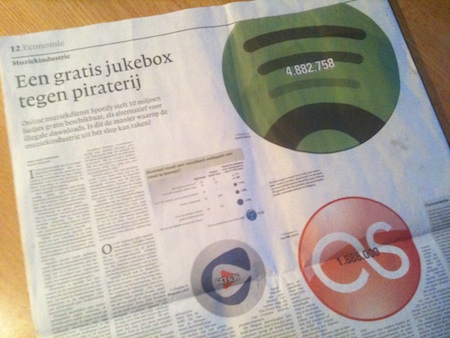All this trouble from this matchbox
When i visited Al-Jazeera back in november last year, Moeed showed me around the campus starting at the brand new Al-Jazeera English newsroom (depicted in the photo above) and ending the tour in the original Al-Jazeera newsroom that now seems to serve as a rather unorganized tape archive (this is the newsroom that features so prominently in the 2004 documentary ‘control room‘). While showing me around Moeed mentioned that Hosni Mubarak when he visited Al-Jazeera was heard to remark “All this trouble from a matchbox like this”. The guardian also mentions this remark in a 2003 piece on Al-Jazeera:
Al-Jazeera’s headquarters is pretty small. The squat, blue-roofed building in Doha is dwarfed by surrounding palm trees, satellite dishes and transmission masts. “All this trouble from a matchbox like this,” the Egyptian president, Hosni Mubarak, once exclaimed when he arrived to take a look.
These days AL-Jazeera’s operation has certainly outgrown the shoebox that it started in and it is clearly causing Hosni Mubarak even more trouble. In fact it is probably contributing to the end of his regime while i am writing this.
As a matter of fact Al-Jazeera (English – but i assume that this is the case for their arabic channel as well) is doing an impressive job at covering the events unfolding in Egypt. This is not only true for the journalistic quality of their coverage, which as far as i can judge is really good (and if you do not want to depend on my judgement, you might have noticed that even the New York Times, which often describes Al-Jazeera as biased seems to think so as well).
I am equally (if not even more) impressed by the delivery of Al-Jazeera English. No need to have a television anymore to follow events like the ones unfolding in right now Egypt. I started following the events yesterday afternoon at the office via a mirror of the Al Jazeera English stream (the official player crashes the flash plugin in chrome for me):

al jazeera english via justin tv
Now this is not that spectacular anymore (guess it would have been 2 years ago) but being able to leave the office and continue watching the same stream on my iPhone is something that still manages to impress me (especially if you consider that they manage to keep the stream stable even though there must be enormous demand).

al jazeera english on the iphone
In fact i managed to continue watching the stream for a good part of the train journey to Eindhoven. Ironically – but not surprisingly to dutch people – the railway company failed to provide sufficient seating capacity so i ended up standing while following the events on my phone. Guess that means that we have really arrived in the 21st century where you ubiquitous access to video streams is more reliable than railway services…





 Ad for sanitary napkins close to
Ad for sanitary napkins close to 